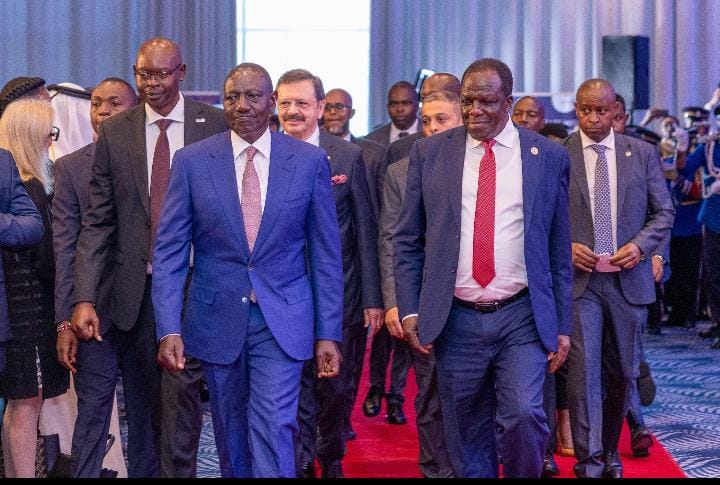 President William Ruto and Cooperatives Cabinet Secretary Wycliffe Oparanya when he opened the World Chambers Federation, Africa summit, 2025 in Nairobi on April 9, 2025/PCS
President William Ruto and Cooperatives Cabinet Secretary Wycliffe Oparanya when he opened the World Chambers Federation, Africa summit, 2025 in Nairobi on April 9, 2025/PCSPresident William Ruto has announced that Kenya is overhauling its business processes to create a more efficient and investor-friendly environment.
He said the government, working closely with the Kenya National Chamber of Commerce and Industry (KNCCI), is actively addressing entrepreneurs' concerns to improve the ease of doing business in the country.
In his address during the opening of the World Chambers Federation (WCF) Africa Summit 2025 at a Nairobi hotel Wednesday, Ruto pointed out that a conducive environment for investment remains the government's commitment.
"We are committed, as a government and in partnership with the chamber of commerce, to build an environment where every small business can grow, thrive, and flourish," he said.
The President said chambers of commerce serve as vital bridges between policymakers and enterprises.
"They amplify the voice of the shopkeeper in Mombasa, the farmer in Uasin Gishu, and the tech innovator in Nairobi," Ruto said.
He pointed out that the KNCCI, with its presence in every county, has stood as a critical ally in Kenya’s economic journey.
"When it highlights bottlenecks in tax, licensing, or infrastructure, we listen because in that voice is the pulse of our entrepreneurs," he said.
The WCF Africa Summit 2025 will host 4,500 delegates, 350 exhibitors and leaders shaping Africa’s future in trade, innovation, and sustainability.
The summit will focus on boosting trade and investment, promoting sustainable practices, empowering youth and women, funding MSMEs, mentorship, and market access, driving innovation to solve local challenges and strengthening regional integration under the African Continental Free Trade Area.
At the same time, the President stated that the government has rolled out a Unified Business Permit that is streamlining multiple licences into a single digital certificate.
This reform, spearheaded by KNCCI and county governments, is being expanded nationwide, the President explained.
"Our overarching goal is to cut red tape, eliminate bureaucratic bloat, and allow entrepreneurs to focus on building, not filling paperwork," he said.
Meanwhile, President Ruto urged the participants to take advantage of integration in the African Continental Free Trade Area, the Tripartite Free Trade Area and the East African Community to boost trade initiatives.
He said the African Union was reforming institutions to unlock trade opportunities in the continent.
"We have mineral resources and energy potential that remain untapped in the region," he said.
He pointed out that Kenya is committed to the African Continental Free Trade Area and to EAC integration, and to deepening partnerships that align with Kenya's development vision.
International Chamber of Commerce (ICC) chairman Philippe Varin praised Kenya for playing a key role in regional value chains.
He said it was time Africa increased trade globally, pointing out that it has a vibrant and young population as well as available resources like minerals and energy potential.
"ICC is committed to working with African countries to ensure they achieve their trading objectives," Varin said.
Dr. Jeph Akaehie, the co-founder of Afroganiks, who was present, lauded President Ruto for his visionary leadership. This, while expressing his full commitment to the initiative, describing the platform as a powerful call to action for increased investment across Africa.
He expressed his commitment to driving growth in the manufacturing sector and fostering meaningful collaborations with stakeholders across the continent.
"As part of my commitment, I will be investing significantly in the health sector, particularly in the production of 100 per cent organic health products for the African market," he said.
Dr. Akaehie also commended the Ghana High Commission in Kenya for its role in strengthening intra-African partnerships.
KNCCI President Erick Rutto noted that the summit is a defining moment for Africa to assert its role as a global trade leader.
He said deeper integration under the African Continental Free Trade Area could boost African trade by $150 billion annually by 2030, saying it is time to strengthen collaboration for innovation and trade efficiency.











